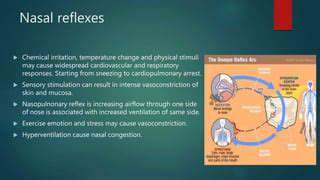What Triggers the Sneezing Reflex?
Common Stimuli Inducing Sneezing
The sneezing reflex can be triggered by a variety of external stimuli. One of the most common culprits is the presence of irritants in the nasal passages. Particles such as dust, pollen, and pet dander can stimulate sensory nerves, prompting the body to expel these foreign substances through sneezing.
Temperature changes can also trigger the sneezing reflex. For example, sudden exposure to cold air, such as stepping outside on a chilly day, may lead to a sneeze as the body attempts to adjust to the new environment. This reflex helps protect the delicate membranes within our nasal cavities.
Moreover, strong odors, including perfumes, cleaning products, or other chemical scents, can irritate the nasal lining, causing a sudden need to sneeze. This reaction serves as a mechanism to clear potentially harmful substances that might enter our respiratory system.
The Benefit of Sneezing in Health Maintenance
Despite being an involuntary action, sneezing plays a vital role in maintaining overall health. By expelling irritants and pathogens, sneezing acts as a protective barrier that safeguards the respiratory system. This reflex helps to keep the airways clear, reducing the risk of infections and respiratory issues.
Furthermore, sneezing can help prevent the entry of harmful particles into the lungs. By forcefully expelling air and mucus through the nose, the body effectively clears any foreign intruders that could potentially cause harm if inhaled.
Additionally, sneezing can enhance the immune response. When irritants are detected, the body releases histamines that facilitate the sneezing reflex. This response not only clears the nasal passages but also prompts the immune system to become more vigilant against potential threats.
Moreover, sneezing can provide temporary relief from nasal congestion. By forcefully expelling mucus, the body alleviates pressure in the sinuses, leading to a sense of comfort and improved airflow. Thus, the sneezing reflex is not merely an annoyance but an essential aspect of our body's health maintenance mechanisms.
The Health Benefits of Sneezing
The Mechanism Behind Sneezing
Sneezing is a complex reflex action primarily triggered by irritants in the nasal mucosa. When particles such as dust, pollen, or smoke are detected, sensory nerve endings send signals to the brain. This initiates a cascade of responses that prepare the body to expel the irritant.
During a sneeze, several physiological changes occur: the diaphragm and abdominal muscles contract, pressure builds in the chest, and the vocal cords close momentarily. This buildup culminates in a forceful expulsion of air through the nose and mouth, often reaching speeds of up to 100 miles per hour.
The body's ability to sneeze serves as a protective mechanism, helping to clear out irritants and pathogens. This reflex can also be a response to sudden changes in temperature or exposure to bright lights, showcasing its role in maintaining respiratory health.
Health Benefits of Sneezing
Sneezing plays a significant role in maintaining nasal and respiratory health. By clearing out irritants and pathogens, sneezing reduces the risk of infections and respiratory ailments. This reflex action helps to eliminate mucus, allergens, and other foreign materials from the airways.
Moreover, sneezing can stimulate the immune system. The expulsion of pathogens triggers an immune response that promotes the production of antibodies and other protective agents, enhancing the body’s ability to fend off illnesses.
In addition to its protective functions, sneezing can also contribute to overall well-being. The act of sneezing can relieve pressure or discomfort in the nasal passages and sinuses, making it an essential part of bodily function that can lead to a sense of relief.
When Sneezing Becomes a Concern
While sneezing is generally a healthy reflex, excessive sneezing can be a sign of underlying health issues. Allergies, respiratory infections, and irritants are common causes of frequent sneezing. In such cases, it is crucial to identify the trigger to effectively manage the symptoms and protect one's health.
Additionally, sneezing can sometimes lead to complications. For instance, forceful sneezing can result in physical strain on the body, potentially leading to headaches, and rib injuries, or exacerbating conditions like asthma. It is essential to practice proper sneezing etiquette to minimize the spread of illnesses.
If sneezing is accompanied by other symptoms such as fever, persistent nasal congestion, or difficulty breathing, it is advisable to consult a healthcare professional. Early intervention can prevent further complications and ensure appropriate treatment.
Sneezing and Social Etiquette
Understanding the social implications of sneezing is important for maintaining personal and public hygiene. When one sneezes, it is customary to cover the mouth and nose to prevent the spread of respiratory droplets. Using a tissue or the elbow is recommended to minimize contact with infectious material.
In social settings, frequent sneezing can lead to misunderstandings. Many people may react with concern or discomfort at the sight of someone sneezing, particularly in light of recent public health situations. Thus, being mindful of how sneezing is perceived can enhance social interactions and promote a sense of community health.
In workplaces and public spaces, having clear guidelines regarding sneezing can help prevent the spread of illnesses. Encouraging good practices like staying home when sick or using hand sanitizer can help create a healthier environment for everyone.
Sneezing and Emotional Responses

The Connection Between Emotions and Sneezing
Sneezing is often associated with physical stimuli like allergens or irritants, but it can also be triggered by emotional factors. Studies indicate that strong emotions such as laughter, anger, or even crying can lead to an enhanced sneezing reflex. This demonstrates how interconnected our physical and emotional responses are.
When a person experiences a sudden emotional release, the body may react with a sneeze as part of the autonomic nervous system’s response. This involuntary reaction shows how our emotional state can manifest physically in unexpected ways.
Interestingly, some people may sneeze when they feel strong emotions, such as happiness or surprise. This phenomenon, known as “photic sneeze reflex,” highlights the complexity of our body's reactions to emotional stimuli.
Additionally, understanding this connection can help healthcare professionals better assess unexplained sneezing occurrences in patients, leading to more effective treatments and management strategies.
Sneezing as a Social Signal
Sneezing is not only a biological response but can also serve as a social signal in our interactions. When someone sneezes, it often elicits a reaction from those around them, commonly a polite "bless you" or similar acknowledgment. This creates a small yet meaningful social connection among individuals.
In different cultures, the responses to sneezing may vary, influencing societal norms and behaviors. These responses often reflect societal expectations regarding health and etiquette.
Moreover, the context of a sneeze can change its interpretation; a sneeze in a crowded space might prompt concern about illness, while a sneeze during a light-hearted moment might simply encourage laughter. Understanding these nuances can improve our social interactions and enhance awareness of others’ feelings.
Ultimately, the act of sneezing can bridge emotional expressiveness with social dynamics, revealing much about human behavior and the importance of communication in our daily lives.
When Sneezing Becomes a Concern

Understanding the Sneezing Reflex
The sneezing reflex is a protective mechanism that allows the body to expel irritants from the nasopharynx.
When irritants such as dust, pollen, or smoke enter the nasal passages, they trigger sensory neurons.
These neurons send signals to the brain, which then coordinates the sneezing action.
This reflex not only clears the nasal passages but also serves to protect the respiratory system.
Understanding this process can help individuals appreciate the importance of sneezing in maintaining respiratory health.
Common Triggers of Sneezing
Sneezing can be triggered by a variety of factors including environmental allergens, infections, and strong odors.
For many individuals, pollen and pet dander are primary culprits, especially during seasonal changes.
Infections such as the common cold or sinusitis can also lead to frequent sneezing as the body attempts to fight off pathogens.
Some people may experience sneezing spells in reaction to certain smells, such as strong perfumes.
Recognizing individual triggers can help mitigate excessive sneezing.
When Sneezing Becomes a Concern
While sneezing is generally a normal bodily function, excessive sneezing may indicate an underlying issue.
Conditions such as allergic rhinitis or persistent infections may require medical attention.
In some cases, sneezing can be accompanied by other symptoms like nasal congestion or a runny nose, signaling more severe conditions.
It's essential to consult a healthcare provider if sneezing interrupts daily activities or worsens over time.
Timely medical intervention can help address the root cause of excessive sneezing.
The Impact of Sneezing on Social Interactions
Sneezing can influence social dynamics, especially in crowded or enclosed spaces.
Individuals may feel embarrassed or self-conscious after sneezing, particularly in professional or social settings.
Public perceptions about sneezing can lead to misconceptions, especially during flu seasons.
Therefore, practicing good etiquette, such as using tissues and covering the mouth, is important.
Such actions can help reduce the spread of germs while promoting a more comfortable social atmosphere.
Prevention and Management Strategies
Preventive measures can play a crucial role in reducing the frequency and severity of sneezing episodes.
Regular cleaning to reduce allergens in the home environment can minimize sneezing triggers.
Using air purifiers and maintaining a dust-free living space are effective strategies.
For those with allergies, over-the-counter antihistamines may offer relief from sneezing and other symptoms.
Implementing these strategies can significantly improve quality of life for those affected by excessive sneezing.